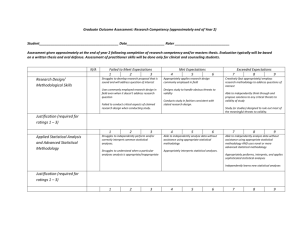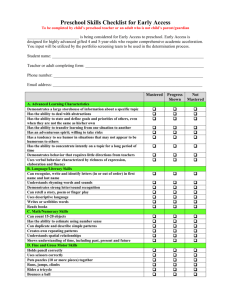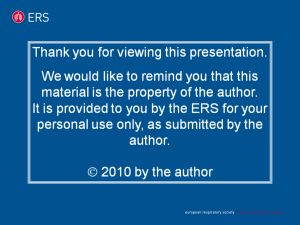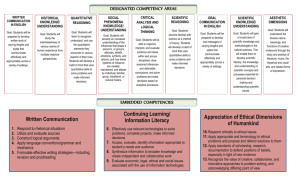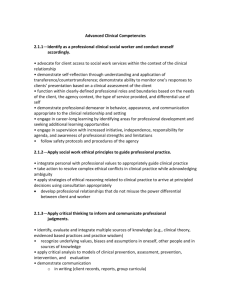Year 1
advertisement
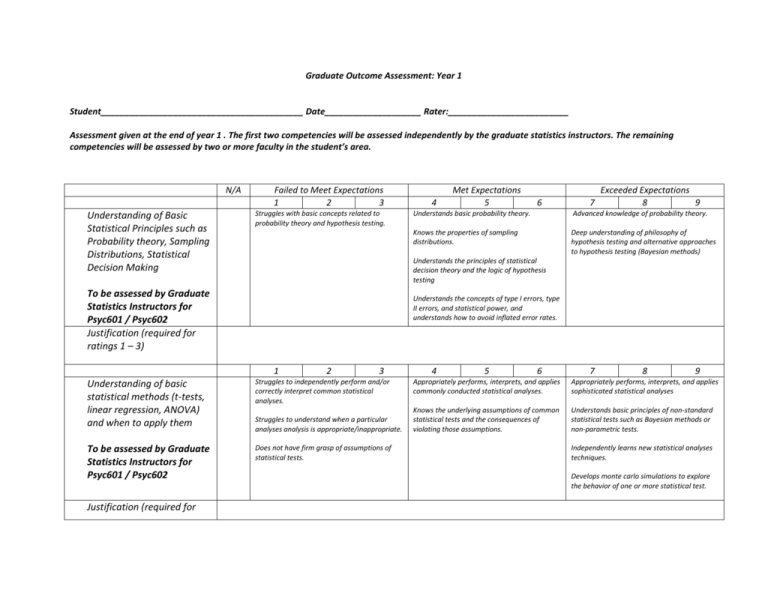
Graduate Outcome Assessment: Year 1 Student__________________________________________ Date____________________ Rater:_________________________ Assessment given at the end of year 1 . The first two competencies will be assessed independently by the graduate statistics instructors. The remaining competencies will be assessed by two or more faculty in the student’s area. N/A Understanding of Basic Statistical Principles such as Probability theory, Sampling Distributions, Statistical Decision Making Failed to Meet Expectations 1 2 3 Struggles with basic concepts related to probability theory and hypothesis testing. 6 Exceeded Expectations 7 8 9 Understands basic probability theory. Advanced knowledge of probability theory. Knows the properties of sampling distributions. Deep understanding of philosophy of hypothesis testing and alternative approaches to hypothesis testing (Bayesian methods) Understands the principles of statistical decision theory and the logic of hypothesis testing To be assessed by Graduate Statistics Instructors for Psyc601 / Psyc602 Justification (required for ratings 1 – 3) Understands the concepts of type I errors, type II errors, and statistical power, and understands how to avoid inflated error rates. 1 2 3 Understanding of basic statistical methods (t-tests, linear regression, ANOVA) and when to apply them Struggles to independently perform and/or correctly interpret common statistical analyses. To be assessed by Graduate Statistics Instructors for Psyc601 / Psyc602 Does not have firm grasp of assumptions of statistical tests. Justification (required for 4 Met Expectations 5 Struggles to understand when a particular analyses analysis is appropriate/inappropriate. 4 5 6 7 8 9 Appropriately performs, interprets, and applies commonly conducted statistical analyses. Appropriately performs, interprets, and applies sophisticated statistical analyses Knows the underlying assumptions of common statistical tests and the consequences of violating those assumptions. Understands basic principles of non-standard statistical tests such as Bayesian methods or non-parametric tests. Independently learns new statistical analyses techniques. Develops monte carlo simulations to explore the behavior of one or more statistical test. ratings 1 – 3) 1 Understanding of ethical conduct of research 2 3 Did not complete or failed to pass the online ethics training (CITI training) 4 5 6 Has completed and passed the online ethics training (CITI training) 7 8 9 Has completed and passed ethical research training seminars offered by campus (CITI training), and has completed one or more courses on research ethics or has completed independent research on research ethics. Justification (required for ratings 1 – 3) 1 Written Communication Skills 2 3 4 5 6 7 8 9 Writing o is weak Writing is adequate Writing is publication quality Numerous grammatical and spelling errors Some grammatical and spelling errors No grammatical or spelling errors apparent Organization is poor Organization is logical Organization is excellent Poorly Documented Adequate Documentation Excellent Documentation Justification (required for ratings 1 – 3) 1 Oral Communication/ Presentation Skills 2 3 4 5 6 7 8 Lack of logical progression Adequate logical progression Strong logical progression Monotone voice Vocal delivery exhibits some energy and enthusiasm Clear and consistently understandable Sometimes audible or inaudible Consistently too fast or too slow Gap fillers (ums/uh) interfere with expression Makes little or no eye contact with audience 9 Pace of presentation was mostly effective Pace of presentation was consistently effective Presentation has few gap fillers (ums/huhs). Minimal number of gap fillers Makes eye contact with limited group within audience Consistently makes eye contact with all members of audience Justification (required for ratings 1 – 3) 1 Practitioner Skills 2 3 Struggles when working with clients to behave in a fashion consistent with 4 5 6 Appropriately applies psychological theories when working with clients with minimal 7 8 9 Could be expected to appropriately apply psychological theories when working with (Clinical and Counseling areas only) psychological theories despite supervision supervision clients even if not directly supervised. Struggles when working with clients to follow accepted practice despite supervision. Appropriately applies psychological practices with clients with minimal supervision Behavior could be questions in terms of conformity with ethical principles Follows ethical practices with clients Could be expected to appropriately apply psychological practices with clients even if not directly supervised. Struggles with establishing rapport and maintaining healthy relationship with client Justification (required for ratings 1 – 3) Overall evaluation (mean): Recommended Course of Action, if needed: Establishes rapport and maintains healthy relationship with client Empathetic and connection with clients exceeds expectations for new Ph.D. Expected to follow ethical practices
